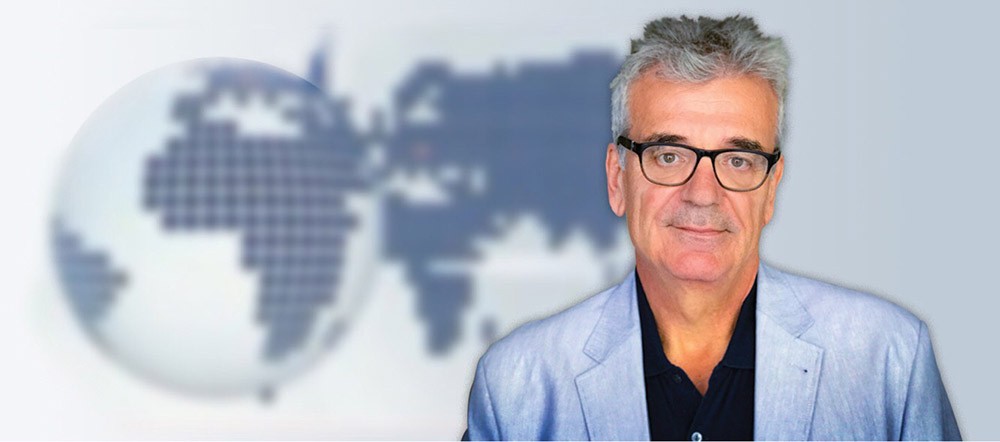
LIFE AND TELEVISION ON SUMMER SCHEDULE
Public service- the most important element of the media strategy
The concept of Public Service was made at a time when the state had a greater role in the life of an individual, when the TV technology was analogue and when it involved three basic functions:
1.To inform
2. To educate
3. To entertain
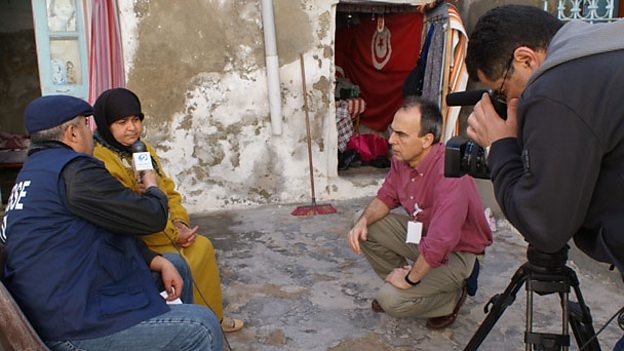
This was the order set by the Charter of the United Kingdom which regulates the operation of their public broadcaster BBC, considered to be not only the best public service in the world, but also an example to other public services, how they should operate. This is why, quite frequently, RTS makes references to BBC practice.
True, I hope that RTS has a smaller wage gap between men and women, something that shook the BBC these days when they published their earnings and differences in pays.
But this Charter contains a key sentence: "In achieving all these tasks, the state and society require that BBC public service remains completely independent in achieving these goals." Facing tough competition, and because of uncertain funding, Serbian Public Service embarked on a race for ratings, and accordingly, reversed the order of tasks.
1.To entertain
2.To inform
3.To educate
The fact is that this is a matter of editorial policy, but also a question for the state and the Serbian society and what they want from public service. Part of the new media strategy will be devoted precisely to the topic of Public Service – how do both the state and the society see its development in terms of new technologies and new relations in the country. In these reflections, the participation of civil society is invaluable. Media strategy, no longer than a few pages, should be the foundation of its development, followed by the laws and other acts which would regulate the rest.
For the Public Service this means that the society expects to be objectively and professionally informed and in some way educated, but the least of all- entertained. Entertainment is sometimes better done by commercial televisions. The Public Service must be independent in pursuing these objectives.
The third, and perhaps the most important thing, is that the state and society ensure its stable and regular funding.
However the Public Service should, with the help of the state, be reduced to a size proportional to the country of Serbia. As we know even from the socialist times, public hearings do not seem to contribute much. First ideas for the functioning of Public Service should come from the state, followed by the civil society and the society, and then when the management translates all this into some sort of a plan, the state should decide on the ways to provide support.
The public service must be independent editorial policy-wise, but also financially. However, in its current form, the public service is too large. If the number of MP’s is discussed in the Parliament, then the wise heads should probably discuss the optimal number of employees in the Public Service as well. If the state has the funds for severance pays in education, it should also find the money for those in the public service also- in order to make it functional, efficient and of highest quality. Let's be realistic: Cheap but good television – doesn’t exist. But the question of its internal organization and efficiency is of greater importance.
But let us leave these issues to the leadership, ministries and the people who are drafting the new media strategy. I just think that instead of discussing whether cable operators should have their own TV channels, Public Service should be one of the main topics of the new media strategy. This choice is very easy; you can the examples of it worldwide. There too it was unusual at first, but today it is a standard.
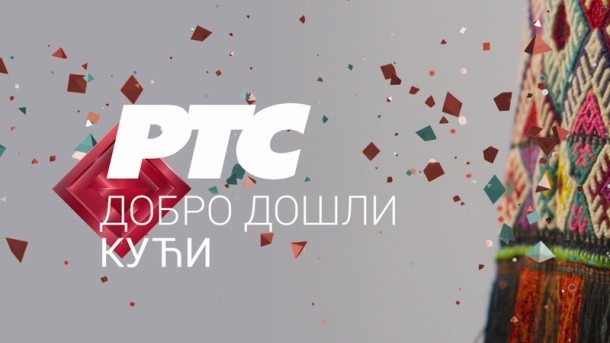
Summer schedules exist on TV, but not in the political life of Serbia
July was organized by the so-called summer schedule, although as far as the daily events are concerned, they don’t pick and choose between summer and winter. Thus we had an expose of the new Prime Minister in the Serbian Parliament. In the annual political schedule of a public service, there are several important events. The biggest are certainly the Elections, and the next one is the occasion on which the new Prime Minister takes office as well as the adoption of the new budget.
For the occasion of the new Prime Minister's exposé, the ''other'' Public Service in Serbia – Radio Television of Vojvodina - had two special shows. They even had a promo designed. But when it comes to the biggest public service, other than the professional reporting and the appearance of prof. Vuletic, I hadn’t noticed that any debate was organized, either before or after the exposé. It's possible that I missed it, so I apologize in advance, but it is a common practice that there is a special program in which guests speak before and especially after the exposé, analyzing it.
Furthermore, I think that the public service should “mix” the scheme a bit. For instance, “Oko' at 6.30 PM sometimes has a daily topic, and sometimes it’s a debate. I think it might be useful to move the'' Oko'' to a later timeslot, maybe after the News 3 and form it as a topic of the day, such as HRT’s "Otvoreno" or "Porta a Porta" at RAI channel. That way, something that is important for Serbia or globally, would be the topic of the day. Again, I am just making a proposition; the company’s management should make the final decision.
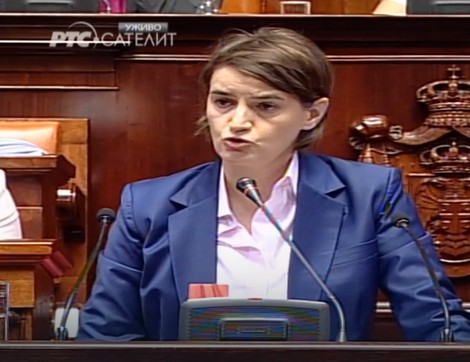
Žikina Šarenica under the sun
Let me immediately say that I am a big admirer of Zika Nikolic and his work. Long ago we worked together on the Belgrade Program. On Saturdays and Sundays I am happy to watch his “Šarenica”. Especially in the summer, when Nikolić, with great support and assistance of the RTS production, travels through Serbia.
This is another Serbia about which we know little about. This is a parade of some young, talented people, who, while living outside of Belgrade, create their own culture and cultural life. Beautiful postcard from Serbia.
Small suggestions. I watched one show in the beginning of July, where Nikolic was near the swimming pool. This is a known problem: On a very sunny day, the host and his guests sit under an umbrella. But then they are in the shade, as the children say "people in the dark tunnel". There are ways to avoid this, and respectable media houses such as RTS simply cannot afford such visual "mistakes". Special lights should be brought for such occasions. HMI reflectors, with special black nets behind the host, similar to mosquito nets, which "kill" the light behind, while they shed light on the host and the guests. I know this because in Baghdad we had the same problem every time in strong sun.
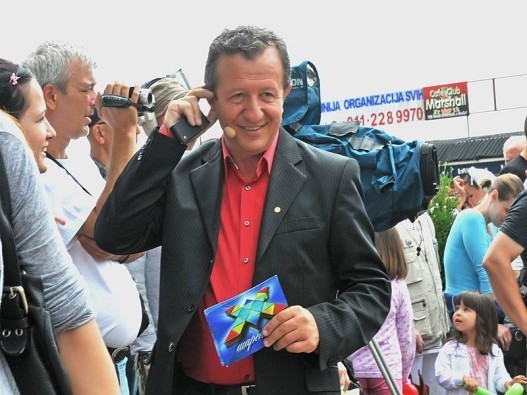
Standards and production
My colleague Aleksandar Vasovic told me that hunters, especially fishermen, are a particularly large and united brotherhood and that their programs are not only popular but also quite watched. I saw the one on RTS produced by Dr Colic. Very good production, editing, camera work. Thus I dare to ask: How come some private productions can, and those produced by RTS can’t manage this task?
Then RTS scores - on the history program with Vladeta Jerotić. Program made at the BBC level. Just my usual complaint: Why is there no so-called "natural sound”- always?
In the morning program, there was an excellent item about a refugee family that escaped first from Bosnia, then from Croatia. How they made a home again, children and women, work, but the tone is muted, or it is very low, or is not set up – like television from the sixties! Such a pity. And then, again, comes the standard of independent production, "Lice i potpetice" , and again the question, why cant this be the standard at RTS? Why is the work done better in a private production, and worse in the RTS? Is this about motivation or the salary? Possibly, but in these few examples there is a notable difference.
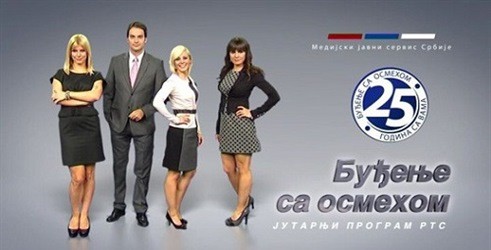
TV faces and TC experiences
Television is now personalized, people are opting to watch artists, journalists, they love. The end to impersonal TV was brought about with the appearance of Goran Milic, particularly after his return from New York. His weekly News had a big author’s stamp. There were also Borivoje Mirkovic, Nikola Vitorović, Momcilo Popovic, not to mention the legends such as Oliver Mlakar, Miloje Popovic and many others.
Today, it seems that the Public Service does not apply this policy of TV Personalization. If not already, then on the road to becoming a TV Person is Jovan Memedović, but my 'problem' 'with him is that I do not know when Memedović is from RTS, and when in a private production. It is a great pity that RTS can not stand behind the production of his travel shows which would be an equal fit to the famous Milan Kovacevic’s show "Karavan."
If that is so, then the RTS should not use him as a Quiz host. Memedović a reporter from the field, for the nowhere lands and this is supposed to be not only his career but also his specialty.
Another TV personality, that public service does not use enough, or does not invest in, is Mira Adanja Polak, who does most of the work alone, finding her ways by any possible means. Imagine her shows if RTS stood behind her? It would be an exclusive beyond exclusive, not to mention that, together with a Danka Novović, RTS would have excellent teachers for young journalists who are new to RTS. Mira's experience is invaluable and it would be a great pity if she would not transfer it to young colleagues.
Here I add Tanja Peternek, who set a standard with her TV faces, and Vesna Dedic with Balkanska Street. It is interesting that some of the mentioned authors are outside of the RTS system.
Why wouldn’t some of the most experienced TV cameraman during the war, Veljko Djurovic, or Miki Stojčić teach young colleagues? It is interesting that Radio Television Belgrade was a nursery of journalists and cameramen that have either worked or still work in foreign companies or TV stations. And none of them had received an offer to come back and work in the Public Service. On the other had, foreign experts are paid, indeed through donations, to do the trainings. I guarantee that our people who have worked or are working for foreign media could be even better instructors and teachers. Such a pity.

“Working hours”
A thought came into my mind: If it is already, a ''rerun on a rerun'' situation, why are then all three channels operating 24 hours? Today they say that breaks don’t really save money. However, I remember my great surprise a few years ago, when I was in Sweden: after the morning program, National TV had a break in broadcasting for a couple of hours! While commercial TVs worked non stop. Do all three programs need to be active at 2 AM? I'm not so sure. One should see the ratings, and then make an estimate. Maybe it's a waste of shows. Or it is the same technical principle as for radio – they make a "play list" and it is automatically broadcast on television. One Sunday we had ''a comedy on the comedy'' situation, on both channels. '' Dolari '' on the first, a "Zajednicki stan" on the second. It is not very smart or skillful to have the same type of program on two channels.
Principles and Memories
A lot of fuss was made about Kunijevic’s protest over the death of the legendary editor Mališa Marinkovića. Statuses on social networks. Answers. So I am just asking a question: does RTS have a system according to which Specials are made? If not, well there should be one. Because when there is a system, the possibility of a mistake is much smaller.
RTS made a dignified farewell to Predrag Cune Gojkovic, but I still advocate that the system is established.
Oh, the innovations
After such a long time a Weather Man. Congratulations for this, a young, relaxed man in front of the cameras- a good change.
Topics and time slots
I believe that the summer is the reason for one set of reruns after another. I say maybe, but as I already stated, the events don’t choose between summer and winter.
Morning program has dedicated a lot of time and attention to family violence, after two murders and violence against women. A 7.45 AM topic. Isn’t it a little early for a conversation which is that long? Here is why I say this: Morning program is more listened to than watched, especially after 8.30 AM, because people simply don’t have the time to sit and watch television. Morning reports shouldn’t last more than a minute or minute and a half, Conversations should be short and clear with the host’s constant weather forecast repetition.
I don’t know if one host in the studio is a consequence of the summer scheme. It’s a pity that for some personal reasons, we don’t see a wonderfully functional morning host couple Milan Srdic and Irina Djordjevic. They were perfect, almost similar to the radio B92 golden age host couple Gorica and Dragan. With two hosts, you gain dynamics and esthetics. Finally, do you prefer a play with more than one actor or a monodrama? I watched Milan Srdic couple of days ago. Morning program suits him. He is an excellent host.
In the morning, people are interested in the weather forecast, traffic and functioning of municipal services. But should the garbage disposal assortment in Belgrade and Pirot be a morning topic? Those are the topics for Belgrade program and Regional chronicle. That’s why the morning program of July 15th was a perfect example of how the morning program should look like. Interesting topics, short reports, relaxed conversations, although Saturday’s program has a more flexible time frame. The appearance of a colleague from Radio Belgrade Natasa Raketic was a real refreshment. There was another great guest, the neurosurgeon Momcilo Djordjevic, although it was too complex of a topic for early morning. The topic of sleeping- was probably slept over by many viewers.
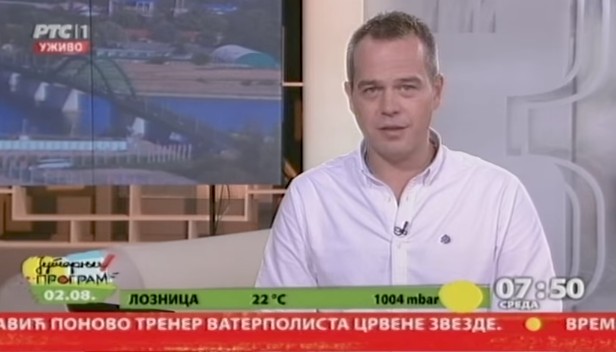
Knowing how to listen
Allow me to quote, with her permission, a statement of one of my favorite TV critics Meri Bilic together with Branka Otasevic and Branislava Dzunov.
“High temperatures must have left some trace on the hosts of the program, who demonstrated poor concentration, rambling on and muddleheaded mood. Example number one: in the morning program, the Radio Television of Serbia (RTS) reporter was talking to a reader Dr. Katarina Lalic, endocrinologist whose topic was the new medicine, injections to be exact, for high level of triglycerides, which are not on the positive list but are obtainable and available for purchase. She also talked about positive experiences of certain patients, when all of a sudden, the reporter interrupted her with an irrelevant common question and left the viewers without the option of finding out the generic name of the medicine”.
What could the solution be? I don’t know if the morning program hosts have the micro bug in order to be in contact with the producer. The producer is “the God himself”. He intervenes and gives suggestions to the host whether to cut or prolong the conversation. One other thing that just doesn’t fit in our scene and seems superficial is the signing out phase of the reporter on the field with the expression “studio”. That is the practice of CNN, or at least it used to be, but why doesn’t it work? Because the host and the production switch off completely since they don’t have to follow the topic of the reporter, knowing that when the reporter says “studio” it’s a sign of the end of the report. It’s too flashy and unnecessary, but it’s how the foreigners taught them.
Moreover, in my opinion the correspondents are some sort of heroes. There are excellent reporters, professionals, some of them are so brave and daring that they end up being prosecuted in court by bureaucrats. The greatest treasure of RTS are the correspondents and correspondent network. Those people are sometimes in the shadow of “base” reporters, while many of them could manage the entire television with very little effort.
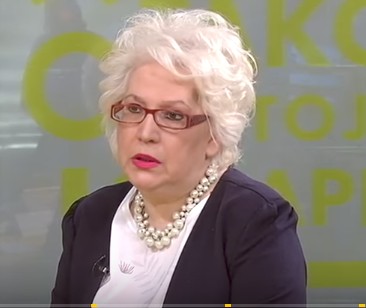
Reporters- now and then
Everywhere I go I repeat that this TV Analysis of mine is made with good intentions because it takes such a small effort to make the public service better. Also, in order to motivate the state not only to help the public service but to exactly define its role and enable its editorial independence. However, sometimes, this is not the case.
I posted a tweet “The cooperation between the tourism and banking sector is good, said the RTS reporter. Why doesn’t someone tell her that Greek banks are receding from Serbia- Piraeus and NBG”. Her reply came shortly after “I only transferred their evaluation. Is there an end to your hatred towards RTS and the frustration it causes??? Jesus…”
Afterwards we exchanged some more texts of “personal nature”.
I’m writing this for many reasons. First to show that the dialogue finally reaches a personal level. This is a Serbian invention created in specific tabloid media. Why hatred, why frustration, why not an argument?
Second, the sentence itself “I only transferred their evaluation”! That is the key problem in Serbian journalism. In my time the reporters were considered a social and political force in charge of transmitting the messages of political leaders. Nowadays reporters have a more complex job- not to take everything for granted. If they do so- what is the point of having them at all?. Host is there to read the news to the people. The reporter has to filter everything the politicians say or at least form the story like this: “according to foreign creditors, Greek banks must recede”, not to mention an excellent opportunity during the press conference for the question: “Gentleman Cipras and Vucic, you have just stated an excellent cooperation in the banking sector, however the Greek banks are receding from Serbia…”
Since the mentioned reporter has stated that I have disappointed her as a human being, I will not be mentioning her anymore. I will only say this: In successful TV stations, it is a common practice for certain reporters to follow the Presidents and Prime Ministers on their business trips. It is a common thing in the USA and England and those visits are not protocol but important, and best reporters should be chosen to criticize and praise. I don’t know why that isn’t the case in RTS any more. Maybe it’s about the democracy in the firm, that each journalist gets to travel in order to have corporate harmony.
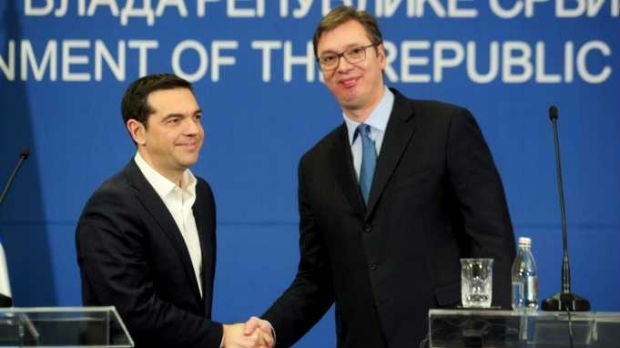
Global experience and local attitude
In addition, I hope that one day the Public Service will have the strength to apply one more globally established system. One team should be in charge of TV News 2 and 3 and the other team should do Saturdays and Sundays. When I was in Radio Television of Vojvodina, I proposed this, and the answer was: “What? To work five days a week- impossible”! The best ones would host and do the work, because as I said, people are oriented towards TV personas, not everyone is fit to host and edit TV News 2 or 3.
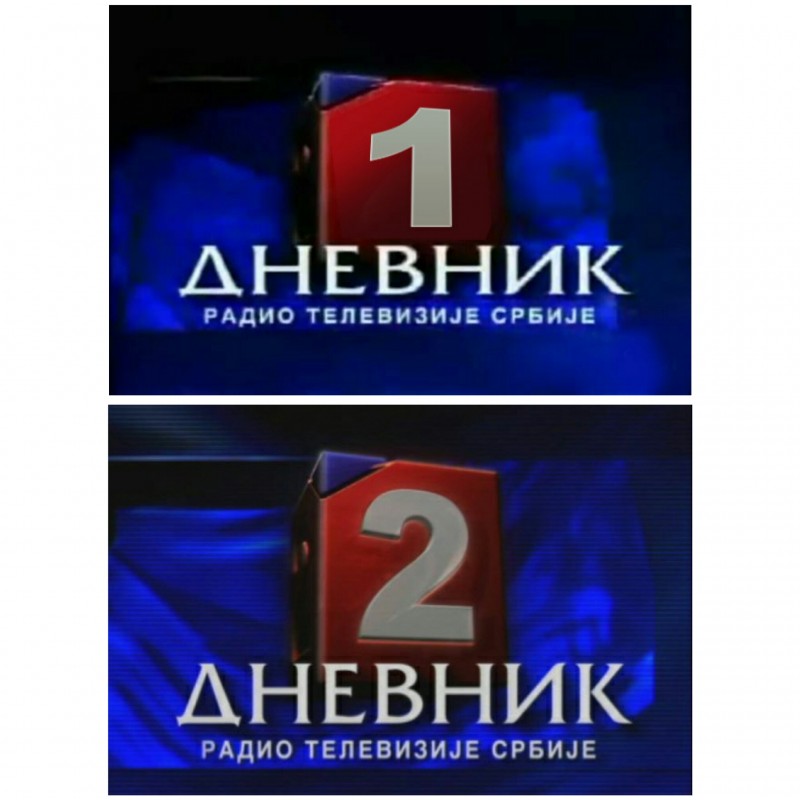
Belgrade Radio
Quite unfairly, I left out Belgrade Radio as one of the main aspects of Public Service. BR has topical debates. For example, the show on Sunday night, July 9th where the guests were Prof. Milan Antonic and the ambassador Ilija Vujacic could be a great example of how a Public Service should perform a debate. I will neglect the fact that BR is the only radio in the region with the national frequency, which still nurtures folk music, but it also has exciting, argumentative shows which society knows and talks about. What is interesting is that, for example, BBC “mixes up” the reporters who work for both the TV and the radio a lot more. So a little bit of editorial audacity from BR could be transferred to Takovska10.
A compliment and a remark
Vesna Damjanic bravely dealt with the Prime Minister Ana Brnabic who expressed a very strong evaluation of the strike in Fiat. When during the interview, you end up with a news flash, then the host should be satisfied for succeeding in extracting a statement like that from the guest.
Speaking of Fiat, my Oscar goes to an excellent report made by Mirjana Brajkovic for TV News on July 17th. That report helped me to find out everything: President’s and Prime Minister’s attitudes, what the strike means, what were the salaries…all that without the image of the reporter. This is the proof of Television being a teamwork, since there were some statements from Vucic and Brnabic that other reporters gave in the past. That is the bottom line of everything, teamwork, not only of the crew but the whole production. However, there are always little oversights that annoy me. In the morning program, the title said Ana Barnabic, and it went on and on and no one thought of correcting it.
When all the media have already reported that the man who killed the woman in front of the Center for Social Work jumped before the train and died, the title kept saying, “An unknown male died near Tosin Bunar”. The essence of the news program is to keep upgrading it with new information. Some would say, “ah, detail”. But the details are the ones spoiling the image of the TV program created and worked on by hundreds and hundreds of people.
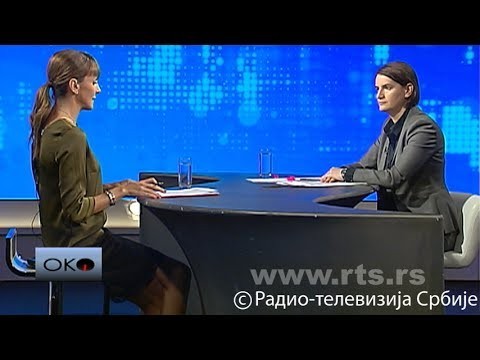
Principles of education
When speaking about the educational character of the Public Service, just a few things should be mentioned. I always mention the campaign “Nije tesko biti fin” (“It’s not difficult to be nice”) which was introduced by Mirjana Bobic Mojsilovic on Radio Television of Serbia. it was consisted of short tips on how to be nice on the street, in the transport, at home. Then Mirjana left and instead of developing the campaign the program was shut down. Couple of years ago on Slovenian Public Service, I saw an educational film on how to behave when your car breaks down in a tunnel. If a developed country such as Slovenia, has a need to educate people on those issues, what are we to do?. RTS has a good chance to influence the education and develop its serious role. It can entertain, but today there are thousands of entertainment channels and commercial TV stations in Serbia. Serbia is one of the few countries, which ignores popular shows broadcast on the other public service such as the British “Downtown Abbey” which gained popularity even in the USA. Not in Serbia- no! They are even doing the reruns, but still nothing. That is not good for the nation- to grow up with Turkish and god knows what other kinds of sitcoms. Movies, especially the ones that come from the countries in the region, are really something.
As Oljaca family stated in the exquisite show and series “Gost” (“The Guest”) by Milan Popovic “Cleanness, cleanness and persistence are the key to the development of Serbian tourism”. Cleanness definitely, but mental hygiene is of utmost importance. The Public Service can be a great influence, much greater than it appears.
While Channel 1 broadcasts a rerun after a rerun, Channel 2 contains productions in which a lot was invested and which deserve to be on Channel 1, since Public Service shouldn’t only inform but educate. Speaking of this, the series “Ekonomska istorija Srba” (“The history of economy in Serbia”) by Bozidar Djuran deserves to be on Channel 1. It’s a pity that he isn’t there, while the “Blago I Babe” reruns are.. A lot of effort and work was invested in the mentioned series. When I compared programs of other regional Public Services, these kinds of thoughtful research series were on Channel 1 and others on Channel 2, this way anyone can watch whatever they like.
Observation and advice
To go back to the essence of TV which was clearly visible in the morning show, which had a crew and a reporter on the spot when the fire broke out in the card factory. That’s what TV is for, from the beginning to the end when the city manager showed up with the fresh information.
A few days ago there was Eurovision competition of choirs. Imagine if the editors had the courage to put this wonderful artistic program on Channel 1 instead of those reruns we have been watching for who knows how long.
The closing credits, which begin with the name of the General Manager, bother me personally since I haven’t seen them on other TVs. I know that this was introduced by Aleksandar Tijanic so he would have some written legacy too, but the Public Service is older than all of us and it doesn’t begin and end with every General Manager that comes to run it. The end of the program is for the people who participated in the production. When you’re watching a movie, is there a name of the 21 Century fox CEO at the beginning or the end? If that was the case, Murdoch’s name would be spinning 24/7 all over the world.
And then comes Public Service of Vojvodina and their negligence.. This happens when the things are done automatically. I’m not a moralist, but where is the logic in showing a the movie “Secerna vodica” on Saturday evening, and having a rerun of it on a Sunday morning.. A long time ago, an American asked me how is it possible that “Sopranos” reruns are shown in the morning? That was, he said, unthinkable in the country he came from.
A Regulating Agency REM user manual exists but nobody cares about the rules. And when I am already comparing the initiative of Belgrade Radio, the show “Sedmica” (“Seven”) about Stepinac was very good- appropriate, meaningful, a lot to hear, a lot to learn. A little piece of advice to my colleague Vladimir Brnic who invested a lot of effort to explain the complexity of the Piran Bay- just a little more graph on how it used to look like and how it is now after the arbitration. Also, on two different channels, two similar shows- “Od zlata jabuka” and “Nasi susreti”. Just a little more focus on the program scheme creation.And a remark to “Oko magazin”. It’s a pity that travel reports are no longer included. A young reporter caught my attention. Nemanja Milutinovic. He did an interview with an Australian Minister of Foreign Affairs. Only it’s not a good idea

My personal “Oscar of the month” and a question
Let’s see who deserves the July Oscars: This time Natasa Mijuskovic for exceptionally edited TV News 2 where the fire was the breaking news and Mirjana Brajkovic for the report on Fiat. Only I must say that in the aftermath of the reached agreement, this news deserved the status of breaking news coverage, not just a crawl.
Finally there is something that confuses me. In the digital age with 4G network how come RTS hasn’t got the emergency system where the reporters tune in by skype, viber or mobile phone. Especially since I know that Zoran Stanojevic is dedicated to modernistic technologies. I know there are Live U systems, but that serves for the fire outbreaks. Imagine if Ana Stamenkovic reported by video link after the earthquakes in Turkey and Greece this way. Sky News developed an application that every reporter must have in their phone, I had it too when I worked in Reuters. It enables the phone videos of emergencies to go directly to the clients. Thank God I was never in a situation to use it.
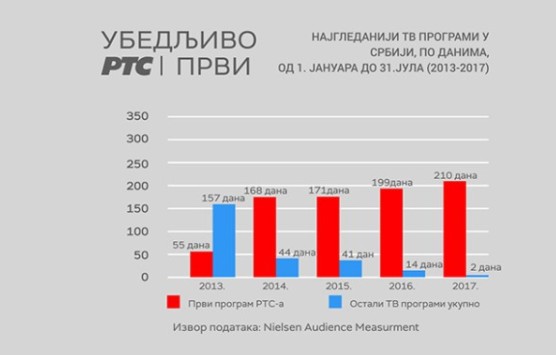
***All in all, the summer scheme is on the screen, not in real life. I hope RTS will be the main stage of Kosovo arguments initiated by the President of Serbia. RTS is the right place for such debates, and I’m positive it will be.
And I’m asking you for the thousandth time, check the crawls in the morning program. Huge effort of the whole crew goes to waste because of the details, spelling and grammar mistakes.
